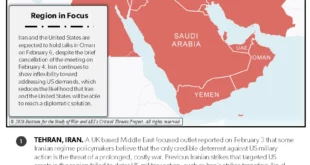Iran’s Foreign Minister Mohammad Javad Zarif says the country has increased the level of its low-enriched uranium production to over 300 kilograms as had been already announced by the country in line with paragraphs 26 and 36 of a 2015 nuclear deal with world powers, officially known as the Joint Comprehensive Plan of Action (JCPOA).
Zarif made the remarks on Monday while answering a question by Iran’s ISNA news agency on the sidelines of a ceremony in the central Iranian city of Natanz.
“According to my information, Iran has surpassed the 300kg limit [in producing low-enriched uranium] and we had already announced [that we were planning to do] this,” Iran’s top diplomat said.
He added, “According to what has been announced, we have said very clearly what we are doing and consider this as part of our rights as per the JCPOA.”
Iran’s foreign minister added that the country had already announced that if steps taken by Europeans to compensate any possible losses to Iran following unilateral withdrawal of the US from the JCPOA were not adequate, it would take steps to reduce its commitments in return.
“We already announced that measures taken by Europeans have not been sufficient, and as the Islamic Republic had announced, we will implement the second stage of reducing our commitments. The first stage is going on both with regard to [the enriched] uranium stocks and heavy water stocks, and the next stage has been announced and will be implemented,” Tasnim news agency quoted Zarif as saying.
Meanwhile, the IRIB news agency also quoted Zarif as saying that the second stage is about the enrichment level, which currently stands at 3.67 percent.
According to IRNA, Zarif said that in a letter penned by Iran’s President Hassan Rouhani to the remaining signatories of the JCPOA, Iran had clearly noted that if Europeans took necessary steps to fulfill their commitments, Iran’s measures to reduce its JCPOA commitments would be reversible.
“However, if they do not take necessary measures, we have been entitled since last year, in accordance with Paragraph 36 of the JCPOA, to take our own appropriate steps,” Iran’s foreign minister said.
‘Iran’s measure can be reversed if Europe abides by obligations’
Also in a tweet later on Monday, Zarif emphasized that the measure does not amount to violation of the JCPOA by Tehran.
“Para 36 of the accord illustrates why: We triggered & exhausted para 36 after US withdrawal; we gave E3+2 a few weeks while reserving our right; [and] we finally took action after 60 weeks,” he added.
Iran’s foreign minister also emphasized that Iran’s measure could be reserved as soon as European sides start to fulfill their obligations as per the JCPOA.
In early May, the ambassadors of the countries remaining in the deal – France, Britain, Germany, Russia and China – received a letter penned by President Rouhani elaborating the suspension of some of Iran’s commitments under the JCPOA.
In that letter, Iran had informed the five remaining signatories to the JCPOA nuclear deal of its decision to suspend the implementation of some of its commitments under the multinational agreement, exactly one year after the United States unilaterally abandoned the international document.
US President Donald Trump withdrew Washington in May 2018 from the JCPOA, reached between Iran and the P5+1 group of countries — the US, Britain, France, Russia and China plus Germany — in July 2015. He also decided to re-impose unilateral sanctions against Tehran.
Under the JCPOA, Iran undertook to put limits on its nuclear program in exchange for the removal of nuclear-related sanctions.
Under the JCPOA, Iran is allowed to keep 300 kilograms of uranium enriched up to 3.67 percent. The deal requires Tehran to sell off any enriched uranium above the limit on international markets in return for natural uranium.
On the first anniversary of the US withdrawal from the nuclear deal, Iran announced that it would suspend the implementation of some of its commitments under the deal, announcing that it would stop exporting excess uranium and heavy water, setting a 60-day deadline for the five remaining parties to the deal to take practical measures towards ensuring its interests in the face of the American sanctions.
On July 17, the spokesman for the Atomic Energy Organization of Iran said the Islamic will surpass the uranium stockpile limit set under the nuclear deal from June 27.
“Today the countdown to pass the 300 kilograms reserve of enriched uranium has started and in 10 days time, we will pass this limit,” Behrouz Kamalvandi told reporters at the Arak Heavy Water Reactor Facility.
“This is based on the paragraphs 6 and 36 (of the nuclear deal), and will be reversed once other parties live up to their commitments,” he added.
Iran may also increase uranium enrichment to up to 20 percent for use in local reactors, he said. The 2015 nuclear accord caps the level of purity to which Iran can enrich uranium at 3.67 percent.
Tehran has said it may go even further by July 8 unless remaining partners to the deal help it circumvent US sanctions and especially enable it to sell its oil.
Earlier in May, Iran announced that it had increased by fourfold the production rate of uranium enriched to 3.67% just a few weeks after the country officially stopped implementing some of its commitments.
Kamalvandi made the remarks while addressing reporters at Natanz nuclear facility, saying, “This issue does not mean an increase in enrichment level or an increase in centrifuge machines or a change in the type of centrifuges, but the production capacity of these 3.67% enriched uranium will be quadrupled.”
He added that Iran has informed the International Atomic Energy Organization (IAEA) of this issue.
IAEA: Iran’s low-enriched uranium stocks exceed JCPOA limit
Shortly after Iran’s announcement, an IAEA spokesman issued a statement, confirming Iran’s report.
“We can confirm that IAEA Director General Yukiya Amano has informed the Board of Governors that the Agency verified on 1 July that Iran’s total enriched uranium stockpile exceeded (the deal’s limit),” the statement said.
An IAEA report sent to member states and obtained by Reuters put Iran’s stock at 205 kg, above the deal’s limit of 202.8 kg.
Earlier on Monday, Reuters had quoted an IAEA spokesman as saying that the agency’s inspectors were verifying whether Iran has accumulated more enriched uranium than allowed under the JCPOA.
“We are aware of the media reports related to Iran’s stockpile of low-enriched uranium (LEU),” the unnamed spokesman said, adding, “Our inspectors are on the ground and they will report to headquarters as soon as the LEU stockpile has been verified.”
Russia: US to blame for Iran reducing JCPOA commitments
Russia’s Deputy Foreign Minister Sergei Ryabkov said later on Monday that US sanctions were to blame for Iran’s move to suspend some of its commitments under the JCPOA.
Ryabkov noted that Iran had warned of its move in advance, urging all parties to “avoid escalation,” and saying that Iran’s move “causes regret, but shouldn’t be overdramatized.”
Ryabkov said the development was a “natural result” of the US’s “maximum” pressure campaign against the country.
He added that Iran was facing “unprecedented and unthinkable” US sanctions, including an oil trade embargo, which are an attempt to “strangle” the country.
UN tells Iran to stick to nuclear deal
For his part, UN Secretary-General Antonio Guterres’ spokesman on Monday urged Iran to stick to its commitments under the nuclear deal and address differences through a dispute mechanism.
“It is essential that this issue, like other issues related to the implementation of the plan, be addressed through the mechanisms established in the JCPOA,” Stephane Dujarric said.
Guterres also encourages Iran “to continue implementing all its nuclear-related commitments under the JCPOA.”
 Eurasia Press & News
Eurasia Press & News



